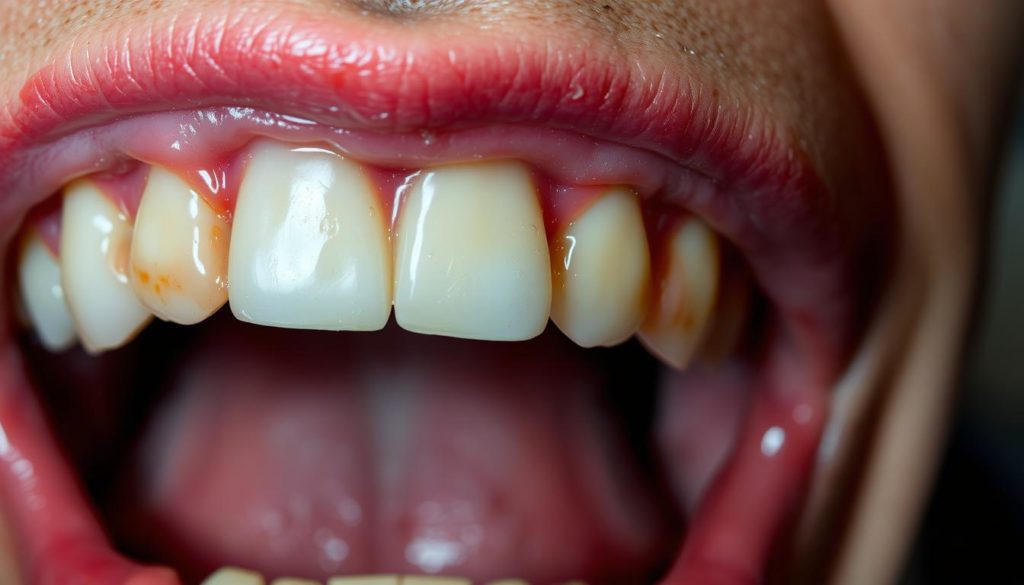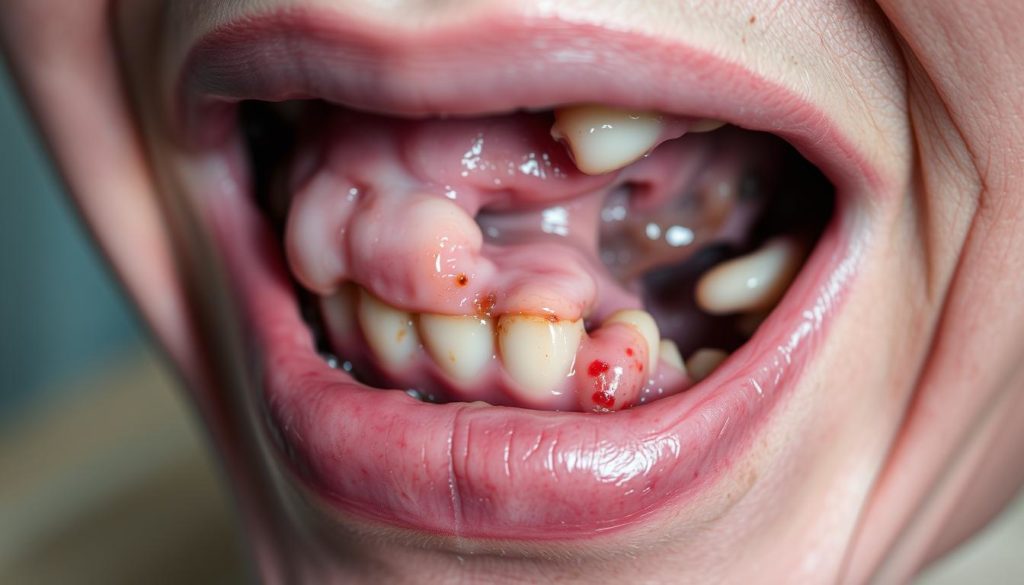Did you know nearly half of Americans over 30 suffer from gum disease? This fact shows how crucial oral health is. It also tells us a lot about our overall health.
The mouth is like a health mirror, say experts like Denis F. Kinane, BDS, PhD. Dental issues can signal problems elsewhere in the body. Issues like gum disease can link to heart disease, diabetes, and Alzheimer’s. This makes understanding the mouth-body connection very important.
Many people have periodontal inflammation, similar in size to a palm. Managing this inflammation is key to good health. It’s why brushing and flossing regularly matter so much.
Dental hygiene keeps your smile shiny and impacts your overall health. Watching for mouth health signs can help detect other issues early. This makes treatment more effective.
The Connection Between Oral Health and Overall Health
Oral health is essential for more than just a bright smile. It deeply connects to our total well-being. Research shows that problems like gum disease can lead to severe health issues.

Understanding the Mouth-Body Connection
The connection between our mouth and body is crucial for good health. Gum disease symptoms can signal other serious issues. In particular, gum disease can lead to systemic problems.
Chronic oral inflammation can spread and affect other body parts. Treating gum disease not only betters oral health but also helps manage heart disease by reducing inflammation.
Impact of Oral Inflammation on Health
Untreated oral inflammation, like gum disease, poses significant risks. It allows harmful bacteria to enter our bloodstream and reach different body parts. People with gum disease are more likely to face cardiovascular issues.
Bacteria from our mouths can lead to clots or artery plaque. This complicates heart and dental health at the same time.
| Condition | Implications |
|---|---|
| Gum Disease | Chronic inflammation, potential link to heart disease |
| Periodontal Disease | Contributes to systemic inflammation, impacting overall health |
| Oral Bacteria | Enter bloodstream, leading to clot formation and arterial plaque |
Knowing the strong link between gum disease, oral inflammation, and health risks is vital. Regular dental checkups are important. They provide insights into our dental and heart health, helping us prevent diseases for a better life quality.
Common Oral Health Issues and Their Health Implications
Oral health issues are not just local; they indicate or can intensify other health problems. Good dental hygiene is essential for total health.

Tooth Decay and Systemic Health
Poor dental hygiene can cause tooth decay, leading to more than just cavities. Decayed teeth’s bacteria might enter your bloodstream. This can cause serious health problems, including heart diseases.
For example, the bacterium Streptococcus mutans causes tooth decay. It has been connected to bacterial endocarditis, an infection of the heart’s lining.
Gum Disease: A Silent Threat
Early stages of gum disease may not hurt, but it can set off body-wide inflammation. This inflammation is linked to diabetes, heart disease, and premature labor in expectant mothers. Keeping up with dental care lowers these health risks, showing the importance of oral health.
Oral Infections and Their Impact
Infections in the mouth, like abscesses or fungal problems, can affect your overall health. If not treated, these can spread and cause more issues. For instance, they’re linked to lung problems like pneumonia. Staying on top of dental hygiene helps prevent these infections and their broader health effects.
| Oral Health Issue | Potential Systemic Health Implications |
|---|---|
| Tooth Decay | Cardiovascular diseases |
| Gum Disease | Diabetes, Cardiovascular disease, Premature labor |
| Oral Infections | Respiratory diseases like pneumonia |
The Role of Bacteria in Oral and General Health
Our mouths are filled with hundreds of oral bacteria types. They play a big role in our dental health. Though most bacteria are safe, some can cause gum disease. This leads to inflammation and can hurt our overall health.
Keeping good oral hygiene is key. It helps prevent gum disease and keeps us healthy.
- Regular brushing and flossing
- Using antibacterial mouthwashes
- Attending periodic dental checkups
- Avoiding smoking
Following these steps helps control oral bacteria. They play a big part in stopping gum disease and looking after our dental health.
| Preventive Measure | Benefits |
|---|---|
| Brushing and Flossing | Removes plaque, reduces bacteria |
| Antibacterial Mouthwashes | Kills germs, freshens breath |
| Regular Dental Checkups | Early detection of issues, thorough cleaning |
| Smoking Cessation | Prevents gum disease, boosts overall health |
Oral Health and Heart Disease: What You Need to Know
The oral-health heart connection is vital for everyone to understand. Gum disease and heart disease are closely linked. Oral bacteria can enter the bloodstream during basic oral care, increasing the risk of heart disease.
Inflammation from gum disease plays a huge role here. When our gums are inflamed, they release harmful chemicals into our blood. These chemicals can lead to arterial plaque, making cardiovascular issues more likely. It shows why good oral hygiene is crucial to fight against heart disease.
| Factors | Oral Health | Heart Disease |
|---|---|---|
| Inflammation | Gum inflammation releases harmful chemicals | Contributes to arterial plaque development |
| Bacteria | Oral bacteria enter bloodstream during oral hygiene tasks | Increases heart disease risk |
| Systemic Effects | Poor oral health can indicate systemic inflammation | Cardiovascular health is impacted by systemic conditions |
The link between dental issues and heart health also includes stroke risks. People with gum disease face a higher risk of stroke. It highlights the importance of oral care in lowering heart-related dangers. So, taking care of your teeth and gums isn’t just about your mouth—it’s about your heart too.
Diabetes and Oral Health: A Two-Way Street
Diabetes and oral health affect each other deeply. For those with diabetes, keeping your mouth healthy is key. It helps in controlling your overall health better.
How Diabetes Affects Oral Health
Diabetes makes people more likely to get gum disease. High blood sugar weakens the body’s germ-fighting powers. This makes it easier for gum disease to get a foothold.
Also, less saliva and more sugar in your mouth make things worse. They let harmful bacteria grow, raising the risk of infections.
Managing Gum Disease to Control Diabetes
Keeping gum disease in check is vital for controlling diabetes. Gum disease makes it harder to keep blood sugar stable. This complicates managing diabetes.
Studies show treating gum disease helps improve blood sugar levels. Good oral hygiene and dentist visits are essential. They help fight gum disease which helps control diabetes better.
What Your Mouth Says About Your Health
Your mouth tells a lot about your health. If your breath is usually fresh, it likely means you take good care of your teeth and health. But, if you have bad breath often, it might mean you need better oral hygiene. It could also point to other health problems.
Looking at your tongue can also show your health status. A pink tongue with a thin white coating is normal. But, if its color, texture, or if sores keep showing up, it might show health issues.
Healthy gums are also key. They should be firm and pink. Bleeding gums or ongoing mouth ulcers are serious. They mean you should see a health expert right away. These could warn of more severe conditions.
Studies link poor oral health with major health threats like heart attacks, strokes, and cancers. Taking care of your oral health is super important. Going to the dentist regularly helps keep your teeth and gums healthy. It can also spot other health issues early on.
Watch out for some common signs:
- Bad breath: Might mean poor oral care or other issues.
- Bleeding gums: Could tell of gum disease or more.
- Persistent mouth ulcers: Might warn of a serious health issue.
- Unusual tongue changes: Shows possible health concerns.
Knowing how your tongue, teeth, and overall health connect is vital. It helps you keep up with oral hygiene. This way, you keep your overall health in check too.
The Importance of Regular Dental Checkups
Going to the dentist regularly is key for great oral health and your overall well-being. These visits let your dentist check your mouth carefully. This means they can catch problems early, before they get worse.
Early Detection of Health Issues
Finding problems like gum disease or oral cancer early can make treatments work better. At checkups, your dentist looks for signs you might not see. This way, you can avoid bigger health issues later.
Routine Cleanings for Prevention
Getting your teeth cleaned often helps stop cavities and gum disease. Dentists get rid of plaque and tartar that your toothbrush can’t. This keeps your mouth clean and reduces the chance of getting infections.
Your dentist will also give tips on what products and brushing techniques to use. This helps keep your teeth healthy between visits.
Pregnancy and Oral Health: Protecting Both Mother and Baby
During pregnancy, good oral hygiene matters more than ever. Changes in hormone levels can make you more likely to get gum disease. This isn’t good for you or your baby. So, it’s vital to pay attention to your oral health now. For help, see the pregnancy oral health risks.
Gum disease can lead to early birth or babies born too small. Keeping your mouth clean is key during pregnancy. Make sure to have dental checkups regularly. Early treatment can prevent bigger problems. Always tell your dentist you’re pregnant. This way, they can take care of you the right way.
Don’t ignore your teeth when you’re pregnant. Instead, it’s time to be even more careful. Brush and floss every day. Also, see your dentist often. This keeps both you and your baby healthy. Visit the March of Dimes for more on oral health when pregnant. They have a lot of good advice for this important time.
FAQ
How does dental hygiene contribute to overall health?
Dental hygiene is key to staying healthy. Regular brushing and flossing fight tooth decay and gum disease. These problems can lead to heart disease, diabetes, and more issues.
What are the signs of health in the mouth that I should look for?
Look for pink, firm gums. They shouldn’t bleed. Your breath should be fresh and your teeth free of cavities and plaque. Regular dentist visits keep your mouth healthy.
What is the mouth-body connection?
The mouth-body connection shows how oral health affects our whole body. For example, gum disease can cause problems in other organs by causing inflammation.
How does oral inflammation impact health?
Inflammation from gum disease can affect your whole body. It can raise your risk for heart disease, diabetes, and Alzheimer’s because of the inflammation.
What are common symptoms of gum disease?
Gum disease signs include red, swollen gums that bleed, bad breath, and loose teeth. Seeing a dentist is important if you have these signs.
How does tooth decay affect systemic health?
Tooth decay can cause infections that spread. It can also make it hard to eat well, leading to health problems.
Why is gum disease considered a silent threat?
Gum disease doesn’t always hurt or show signs until it’s bad. Regular dentist visits can find and treat it early.
What are the implications of oral infections on overall health?
Oral infections can lead to bigger health issues. Bacteria from the mouth can spread and harm the heart, lungs, and other organs.
How do bacteria in the mouth affect general health?
Harmful bacteria can cause gum disease and infections. These lead to inflammation and bigger problems like heart disease and diabetes.
What is the connection between oral health and heart disease?
Bad oral health, especially gum disease, can lead to heart disease. The bacteria can get into the blood, aid plaque build-up in arteries, and cause inflammation.
How does diabetes affect oral health?
Diabetes makes it harder to fight infections. This means gums can get diseased easier. High sugar levels also make gum disease worse, affecting each other.
Can managing gum disease help control diabetes?
Yes. Treating gum disease lowers inflammation and helps control blood sugar. This makes managing diabetes easier.
What can your mouth reveal about your overall health?
Bleeding gums, bad breath, and mouth ulcers can point to health problems. These include heart issues, diabetes, and possible cancers.
Why are regular dental checkups important?
Regular checkups find gum disease and oral cancer early. This stops serious health problems. Cleanings by professionals keep teeth and gums clean and healthy.
How do routine dental cleanings help with prevention?
Cleanings remove plaque and tartar. This stops tooth decay and gum disease. It also cuts the risk of bigger problems caused by inflammation and infections.
What should pregnant women know about oral health?
Pregnancy increases the risk of gum disease. This can affect both the mother and baby, leading to preterm birth and low weight. Dental checkups and good hygiene are very important during pregnancy.


